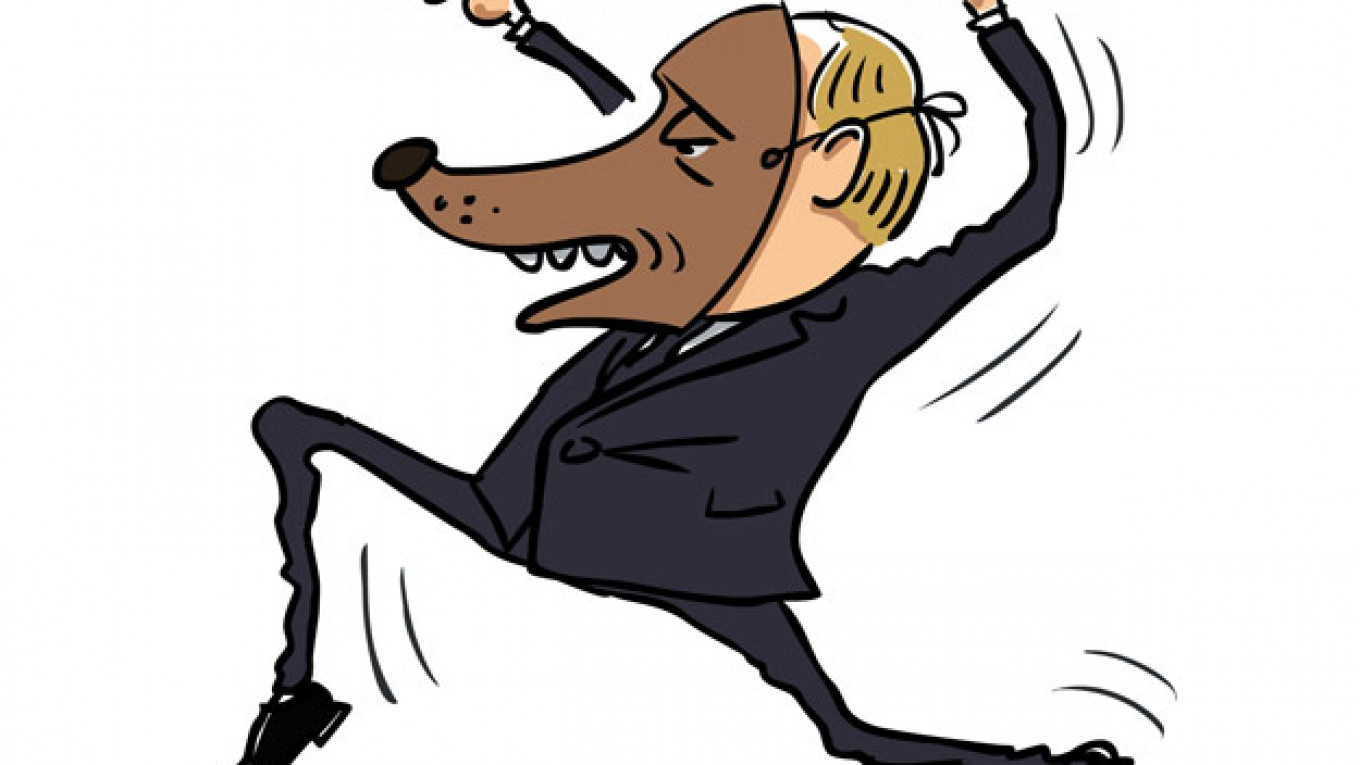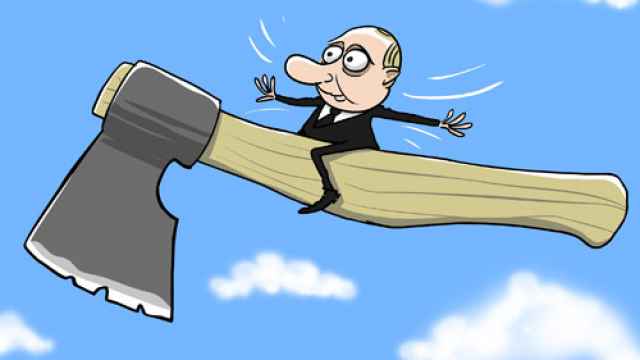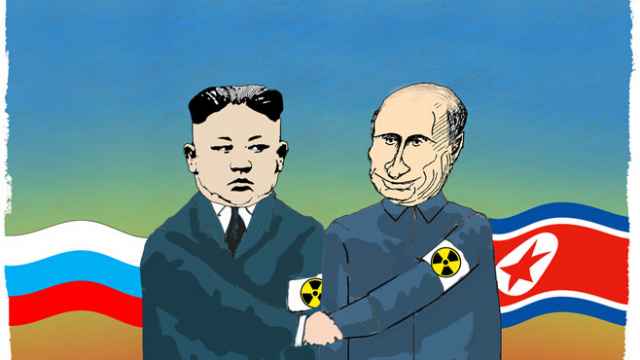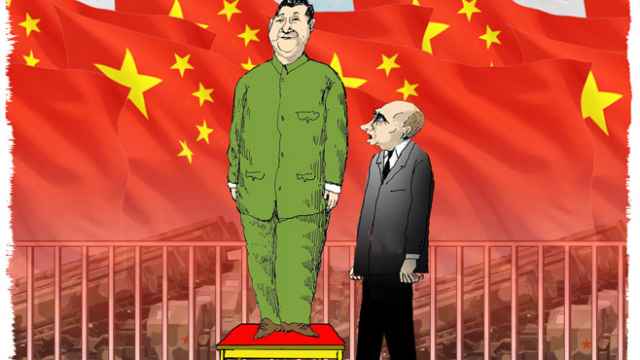I have seen on multiple occasions how Soviet leaders planned the speeches that they would deliver overseas in exactly the same way that they made preparations for military operations — right down to gathering of intelligence, the build-up of reserves and the organizing of logistical support. However, I do not recall ever seeing a leader time his speech to coincide with an actual military operation. And yet the world could soon witness how a Russian leader will use real military operations to back up his words.
For several weeks now the Kremlin has been promoting its idea of creating a broad international coalition to fight the Islamic State. President Vladimir Putin has already said that he discussed the plan with a number of world leaders, including the presidents of the United States, Turkey and Egypt, as well as Saudi leaders and the king of Jordan.
The Kremlin has openly said that the initiative will serve as the focus of Putin's upcoming address to the UN General Assembly in New York. The Kremlin has far-reaching goals for that speech: it hopes that the process of forming such a coalition would free Russia from its international isolation caused by its annexation of Crimea and the war in eastern and southern Ukraine, and also make it a respected member of the world community once again.
However, Moscow leaders cannot be so naive as to believe that the plan might actually succeed. After all, the participants of the proposed coalition have very different attitudes about the regime of Syrian President Bashar Assad. The U.S. and its allies consider that regime to be the root cause of the civil war there and the instigator of the chaos that has engulfed the country.
To the contrary, Moscow and Tehran consider Assad the legitimate ruler of Syria and a future member of the coalition. There is little likelihood of overcoming that disagreement, and so it seems that Putin's initiative is just another propagandistic stunt.
The alleged increased presence of Russian military equipment and personnel in Syria is the top story in the world press. The Los Angeles Times writes: "U.S. intelligence has captured evidence of a significant escalation of Russia's military engagement in Syria's civil war, including satellite images of an apparent Russian base for staging troops and heavy equipment under construction near a port city that is a stronghold for Syrian President Bashar Assad."
Turkish and Israeli media earlier reported that Russian planes were allegedly flying into a base near Damascus in order to join the offensive against the Islamic State. Observers also noted what they called "strange cargo" — probably armored transport vehicles and military trucks — under the canvas on board the large assault landing ship Nikolai Filchenkov after it passed the Black Sea straits and headed in the direction of the Mediterranean Sea.
Numerous photos are circulating on social networks showing Russian marines standing next to portraits of Putin and Assad. Moscow has admitted that there are Russian military personnel in Syria but Foreign Ministry representatives claim that Russia is merely transferring military equipment to Assad's army and training the Syrians how to use it.
However, the fact is that the United States takes the threat of Russian military intervention in Syria very seriously. Washington formally requested that Greece and Bulgaria close their airspace to Russian aircraft.
It is significant that the U.S. sees a connection between Russia's military activity in Syria and Putin's speech at the UN. The plan is to close that airspace to Russian aircraft by Sept. 28 — the same day Putin is scheduled to address the UN General Assembly.
U.S. Secretary of State John Kerry earlier called his Russian colleague Sergei Lavrov to express his concern about reports of a buildup of Russia's military presence in Syria. Kerry said that "if such reports were accurate, these actions could further escalate the conflict, lead to greater loss of innocent life, increase refugee flows and risk confrontation with the anti-Islamic State coalition operating in Syria."
Washington has very specific concerns. It worries that if aircraft from both Russia and the Western coalition occupy the Syrian skies simultaneously, the situation is fraught with all types of potential incidents. The New York Times wrote that Kerry told Lavrov that such support "might even lead to a clash with the U.S.-led coalition." Washington diplomats openly emphasize that Russian air strikes could interfere with air operations that the U.S. and its partners are conducting in Syria. Russian aircraft or Russian-supported Syrian government forces could attack opposition forces that Washington supports. A direct military confrontation between the U.S. and Russia on Syrian territory would hardly advance the cause of peace.
But even if that potential for conflict did not exist, Russia's military involvement in Syria still looks like a reckless gamble. The whole experience of recent decades shows that it is impossible to achieve victory in such a war.
And it's no use taking consolation from the idea that Russia will participate only symbolically in the war, that it will send just a few aircraft and no more. Even those few aircraft need radio support, marines to guard the base and the possibility of bringing in additional troops to defend the airfield in case the situation worsens.
In either case, the Kremlin risks involving Russia in yet another grueling conflict. It is a not-so-clever attempt to save face by starting a new war as a cover for pulling out of the current war in Ukraine. Not having finished the first major conflict, the Kremlin will get itself involved in a second. And as everyone knows, it rarely ends well for those who fight a war on two fronts.
Alexander Golts is deputy editor of the online newspaper Yezhednevny Zhurnal.
A Message from The Moscow Times:
Dear readers,
We are facing unprecedented challenges. Russia's Prosecutor General's Office has designated The Moscow Times as an "undesirable" organization, criminalizing our work and putting our staff at risk of prosecution. This follows our earlier unjust labeling as a "foreign agent."
These actions are direct attempts to silence independent journalism in Russia. The authorities claim our work "discredits the decisions of the Russian leadership." We see things differently: we strive to provide accurate, unbiased reporting on Russia.
We, the journalists of The Moscow Times, refuse to be silenced. But to continue our work, we need your help.
Your support, no matter how small, makes a world of difference. If you can, please support us monthly starting from just $2. It's quick to set up, and every contribution makes a significant impact.
By supporting The Moscow Times, you're defending open, independent journalism in the face of repression. Thank you for standing with us.
Remind me later.







